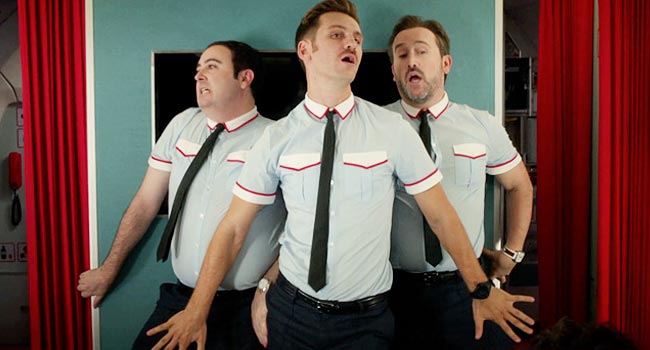Interview: Javier Camara, Blanca Suarez, Miguel Angel Silvestre of I’m So Excited

In I’m So Excited, Pedro Almodóvar’s first comedy in years, a wildly eccentric (crazy) group of passengers on a flight from Spain to Mexico are stranded in the air, as one of the plane’s landing gears is broken. Three fabulously gay flight attendants attempt to ease the passengers’ fears by keeping the mood light, in any way they can (they even bust out a choreographed dance number set to the titular Pointer Sisters tune), though the situation remains dire. As the passengers’ worries bubble over, rampant sex and cocktail guzzling ensue.
Javier Camara plays one of the determinedly upbeat flight attendants, Blanca Suarez, one of the only characters not on the plane, speaks to one of the passengers (her ex-lover) via telephone, and Miguel Angel Silvestre plays a horny newlywed who can’t contain his libido. The three stars took time to talk with us about Almodóvar’s methods, what it’s like to work on a tiny set, comedic mathematics, Spain in the ‘80s, and more.
How was it working on such a tiny set?
Javier Camara: Pedro told me that we (Camara and co-stars Raul Arevalo and Carlos Aceres) were going to work on a plane as flight attendants, so we took classes for a month. We learned all the signals, learned to prepare food. [The airplane set was to scale], so the aisles were very cramped. We thought, “We’re going to be here for two months with Pedro Almodóvar!” It was crazy.
So training was two months?
Javier Camara: One month training, one and a half months of rehearsing with the cast, and two months shooting.
Rehearsal was very important for this film, yes? Can you talk a bit more about the rehearsal process?
Miguel Angel Silvestre: We rehearsed both off and on set. I think Pedro enjoys the rehearsals, and he likes to rehearse everything. If you’ve seen any of his films, it’s his own world, his own code of acting. The rhythm of the lines [is very important.] He’s very specific about what he wants, and the way to [give him what he wants] is a lot of rehearsing and trust, trust in someone to lead you. He wants a specific nonsense in his characters.
Javier Camara: The place gives you a lot of information about your character, too. You’re passengers, and you’re going to die. It’s funny–your seatbelts are fastened, so you have to play your character without any movement. You’ll be talking, but you can’t see the passengers behind you, so there’s a missing connection there. It’s a funny thing. Pedro was worried that the setting of the doomed plane was so sad that the film couldn’t be as theatrical as he wanted, and he’d have to change everything. But, the rehearsals were amazing, because you’re close to the other actors during your monologues, but at the same time, you’re alone in your place. You’re acting very desperate, but it’s also a crazy comedy.
Comedy is very difficult to pull off.
Javier Camara: Yeah. I had to be very over-the-top, very flamboyant, very “queeny”, very crazy. My character has to hide that there was a big problem on the plane, so I’m drinking the whole time. (laughs)
Can you speak a bit about Pedro’s unique knack for dialog? What’s his process, the method to his humor? There’s no one else like him.
Blanca Suarez: I think when Pedro begins to write a script for a film, he gets into the mind of each character, both the dark side and the light side. Even in a comedy, he’s aware that even though a character may be over-the-top, they also have to have a dark side. Sometimes, his instructions seem contradictory to us at first. He’ll tell you, “You’re happy, but you’re also very sad.”
Javier Camara: “You’re smiling, but you have a big problem.” If you want the audience to love these characters, you have to empathize with them. There has to be a balance. You have to hook the audience with some good qualities along with the bad.
Blanca Suarez: That’s life.
It’s funny you say “That’s life”, because Pedro’s films are very surrealistic.
Blanca Suarez: That’s life, too! (laughs)

The way Pedro gets you guys to deliver dialog is hilarious. What’s one of your favorite lines in the film?
Miguel Angel Silvestre: I remember one by Cecilia Roth. It’s like, “A woman, two sons” (trails off). I can’t remember it…
Javier Camara: I remember the scene. I’m drunk, and [I’m trying to calm down] Cecilia Roth: “Don’t worry, the captain is the best man to manage this trip.” She says, “Of course! With a woman, two sons, a lover, and the co-pilot fucking him, of course he controls everything!”
Miguel Angel Silvestre: I remember she was playing it one way, but Pedro wanted a specific intonation.
Javier Camara: There’s a specific rhythm that he’s going for. Comedy is mathematics—I constantly talk about that. There’s a rhythm that you have inside yourself. Pedro will tell you to take a breath [at an odd moment], which kind of breaks the rules, but it works. He gives you a lot of tools. Sometimes, actors don’t understand what he’s trying to tell them, but [his requests are practical.] He gives us the tools. Breathe. Count to three. Say the phrase. Pause. Look at him. Say the next phrase. It works! If you trust in Pedro, he’ll show you the way.
I’m So Excited is very theatrical…
Javier Camara: One day, I was shooting [the central dance number] with Carlos (Aceres), and he was being stupid. “Carlos! It’s not the right foot, it’s the left!” Pedro arrived, and he yelled at me. “What are you doing?! Are you directing my film!?” I said, “I’m sorry, Pedro. We’re supposed to start with the right foot, and he’s starting with the left!” He said, “Do you want to direct this film like it’s theater!” I remember we were talking for a couple weeks about making the film a play, because it’s the perfect theatrical play.
Blanca, your scenes are different because your character isn’t on the plane.
Blanca Suarez: My story is necessary because it gives you a breather. The audience is in this plane for a long time, and suddenly you’re on the ground, breathing the air, seeing the reality on the ground. It gives the audience a break.
Pedro makes a few statements about Spain in the ‘80s throughout the film.
Javier Camara: I think the film is an homage to Spain in the ‘80s. Now, Spain is very different. Pedro started making films in the ‘80s, and it was amazing, because Spain had just finished 40 years of dictatorship. There was a generation of artists, with Pedro at the head, invented a new kind of culture that connected with Luis Bañuel or Goya. They invented a very specific kind of Spanish cinema, talking about our reality, our past, and a huge, wide-open feature. This film recalls that liberty.
